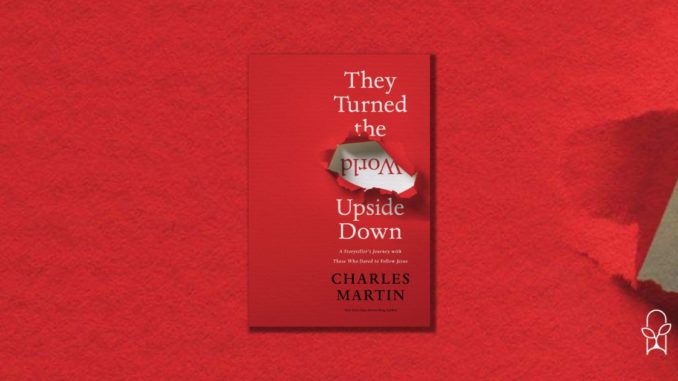
Published by Thomas Nelson on January 5, 2021
Genres: Non-Fiction, Theology
Buy on Amazon
Goodreads

Walk in the shoes of the disciples, as New York Times bestselling author Charles Martin brings their stories to life with his storyteller’s perspective.
In the first century, believer didn’t just mean someone who heard and agreed with Jesus; it meant someone who acted on that belief. And when the outside world saw the faith of these new believers, they declared “they turned the world upside down” (Acts 17:6).
That’s the kind of believer Charles Martin wants us to be. The kind who understands that the truth of Jesus’ life, death, and resurrection is so powerful, it reshaped history. The kind of believer who lives with that same world-changing faith today.
In his second non-fiction work, he uses his talents as a novelist to walk you through the lives of the disciples in the aftermath of the Resurrection and as they spread the message of the Gospel and “turn the world upside down”, leading up to Paul’s ministry in Thessonalica. In his beloved lyrical style, Martin illuminates key moments from Scripture and shares stories from his own life as a disciple.
With the same depth, sensitivity, and emotion that have made his novels beloved to millions, Martin will helps you engage with your faith in a new and inspiring way.
Charles Martin maybe best known for The Mountain Between Us, a story of survival and romance that got turned into a movie with Kate Winslet and Idris Elba in the starring roles. For his whole career, Martin has teetered on the edge of Christian fiction. His novels are relatively clean, convey strong values, and tick every box the Evangelical Christian Publication Association has to qualify Christian fiction—except that he had a “secular” publisher.
Well, contracts end, and while most authors would be pushing for the wider audience of a “secular” publisher, Martin has now found a home firmly in the Christian publishing industry. As part of that, Martin has branched out from fiction into non-fiction (of sorts), first with What If It’s True? and now with They Turned the World Upside Down. Both of these books are billed as a storyteller’s journey, and what Martin means that he will take readers on a sometimes speculative, sometimes reflective journey through Scripture to help readers engage with the biblical text.
They Turned the World Upside Down primarily focuses on the early church and its formation after the ascension of Jesus. At times, the book seems devotional. For instance, Martin chooses to end each chapter with a prayer. But there are too few chapters and the chapters are too long for this to really work with the confines of a typical devotional reading.
At other times, Martin seems intent on writing biblical fiction, using his storyteller mind to opine on the thoughts and motivations of the disciples. This could have been—and should have been—the book’s highlight, but Martin inevitably breaks into the narrative with an apology for his speculation, reminding readers of the liberties he is taking. This lack of full commitment draws the reader away, making them second-guess what they’ve read. The job of an author is to immerse the audience in the story and make them believe. It’s something Martin has built a career doing. But here, he seems unable to convince even himself, so the effect on the reader falls flat.
Martin’s theology is heartfelt and sound, though he does stumble on a few details. Overall, Martin reads Scripture like a layperson, which is fine, but doesn’t come across as an authoritative teacher on the subject. In one example, he explicitly states that Moses and Aaron are the great-great grandchildren of Levi. If you only look at genealogical rolls in Exodus 6, you can understand why—sort of. Amram is listed as the grandson of Levi and the father of Moses, which would be one great, and not two. But even more critical thought would show that there have to be more generations than that. Abraham lived ca. 2000 BC. Moses lived in 1400 BC. Even if you don’t agree with the dates, remember that God told Abraham his descendants would be 400 years in slavery (Gen. 15:13). A good, critical read of the texts in context show that genealogical roles have to be using “beget” (Hebrew yalad) in a generational, not paternal sense. A scholar, or even a critical reader, would have to acknowledge this. Martin misses it.
The concept for They Turned the World Upside Down is good enough, but Martin’s attempt to play biblical scholar over storyteller leads to poor scholarship and clunky storytelling. Because Martin sticks pretty much to Scripture, with only occasional deviations into personal or present-day stories, the narrative ends up with Martin speculating on Scripture in fiction, exegeting it to middling ability in non-fiction, then apologizing for his speculation. Obviously, the first book (which I’ve not read) sold well enough that a sequel was in order, so maybe I’m just not the target audience for the book. I came to this book because of Martin’s name and I wanted to see how he handled non-fiction. I love his fiction and will continue to read his future books, but I’ll leave his non-fiction offers to the side.
